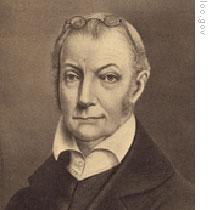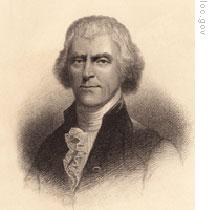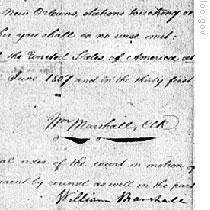VOA慢速英语-THE MAKING OF A NATION - American History Series: Th
搜索关注在线英语听力室公众号:tingroom,领取免费英语资料大礼包。
(单词翻译)
Burr went on trial in 1807 for a secret plot to seize Mexico from Spain. The plan could have divided the Union. But was he guilty as charged? Transcript2 of radio broadcast:
02 July 2008
Welcome to THE MAKING OF A NATION – American history in VOA Special English.
 |
| Aaron Burr |
Aaron Burr was vice3 president of the United States. His term came to an end in eighteen hundred and five. He was heavily in debt and his political future did not look promising4.
Burr was not without plans, however. For some time, he had been considering an idea. He wanted to seize Mexico from Spain. Burr made secret deals with a number of people. He told them different things to get their help or their money for his plan.
What was Aaron Burr's real goal? Was it to seize Mexico? Or was it to create a country of his own out of some of America's western lands? The facts are not clear.
This week in our series, Shirley Griffith and Steve Ember tell about Burr's secret activities, and the trial that ended them.
(MUSIC)
VOICE TWO:
Burr traveled west in the spring of eighteen-oh-five. His trip would take him down the Ohio and Mississippi rivers to the port city of New Orleans. In that city, he talked with a number of rich, powerful men. He explained his plan. And he found support among those who wished to end Spanish control of Mexico.
Burr was then ready to return east and put his plan into action.
VOICE ONE:
On the way back, Burr stopped in Saint5 Louis to see General James Wilkinson, governor of the Louisiana Territory. Wilkinson was plotting with Burr.
At the same time, however, Wilkinson was spying for Spain. He did not want to lose the money Spain paid him for information. So he began to think about how he could pull out of Burr's plan.
He advised Burr that it might be best to forget Mexico, that perhaps the time was not right. He offered to help Burr get back into politics as a congressman6 from Indiana.
Burr rejected Wilkinson's offer. He was not yet ready to give up his dream about Mexico.
(MUSIC)
VOICE TWO:
Burr had hoped to begin his move against Mexico in the spring of eighteen-oh-six. Without money, however, he could do nothing.
He tried to get money from people who might be interested in sharing the riches of Mexico. But he was not successful. Nor did he get the money and ships he had asked earlier from Britain.
VOICE ONE:
 |
| Thomas Jefferson |
War between the United States and Spain was an important part of Burr's plan. Should there be such a war, Burr was sure the men of the western lands would join him against the Spanish in Mexico. Without war, the campaign might fail.
Burr received bad news after he returned to Washington.
He met with President Thomas Jefferson. Jefferson made clear that there would be no war with Spain.
After his meeting with Jefferson, Burr began to make new plans. He would forget the idea of invading Mexico -- at least temporarily. Instead, he said he would build a settlement in Louisiana and wait for a better time.
(MUSIC)
VOICE TWO:
While Aaron Burr had been traveling in the west, stories began to spread about his activities. Newspaper reports came close to accusing him of plotting to split7 the Union. People seemed willing to believe the reports. This was the situation General Wilkinson would use to pull out of Burr's plan.
Wilkinson wrote a letter to President Jefferson. He claimed that a force of ten thousand men was moving toward New Orleans. He said it was part of a campaign against Mexico. He gave details of the campaign, but claimed he did not know who was leading it. He warned the president that the force might try to seize Louisiana as well as Mexico.
VOICE ONE:
It was not the first letter Jefferson received about Burr's Mexican campaign. Nor was it the first to say that Burr was, in fact, planning to split some western states from the Union. But, unlike the other letters, Jefferson accepted Wilkinson's as firm evidence against Burr.
The president called a cabinet meeting to discuss what should be done. The result of the meeting was this: all American military commanders were ordered to stop Burr.
President Jefferson then made a public declaration8. He said a private military campaign was about to begin against the Spanish, and that anyone involved should leave it immediately. The declaration did not speak of Aaron Burr by name.
VOICE TWO:
Jefferson also spoke9 of the private military campaign in his yearly State of the Union message to Congress. Congress asked for more information. In a special message, the president said Burr had several plans. One was to split the western states from the Union. Another was to seize Mexico. He said Burr wanted to make people believe he was building a settlement in Louisiana. But, he said, that was just a trick.
The president said Burr had discovered that the people of the western states would not support any attempt to take them out of the Union. So, the president said, Burr had decided10 to capture New Orleans. Jefferson said there was no question that Burr was guilty.
(MUSIC)
VOICE ONE:
 |
| Court order for President Thomas Jefferson to appear at Aaron Burr's treason trial |
Burr's guilt1 had not been proved in court. But to many Americans, Jefferson's statement was taken as truth. Some demanded that Burr be put to death for treason.
The crime of treason, as explained in America's Constitution, is the act of a citizen making war against the United States.
Burr was arrested in February, eighteen-oh-seven, and taken to Richmond, Virginia. A federal grand jury11 hearing would be held to decide if there was enough evidence to bring him to trial. In June, the grand jury officially charged him with treason. Burr would stand trial before John Marshall, chief justice of the United States.
VOICE TWO:
At one point in court, Burr spoke for himself. "Treason," he said, "is not possible without action. Yet I am being attacked -- not for acts -- but because of false reports about what I might do. The whole country has been turned against me. Is this justice? Wilkinson frightened the president with his reports about me. Then, the president frightened the people."
(MUSIC)
VOICE ONE:
It was true that President Jefferson wanted to prove Burr guilty. He ordered government officials in all parts of the country to find witnesses who could give evidence against Burr.
Some of Jefferson's opponents said he did this to turn the trial into a political battle. They believed he wanted to use the trial record to attack Chief Justice Marshall, who was a member of the opposition12 Federalist Party. Jefferson objected to the way Marshall controlled the Supreme13 Court. He felt Marshall used his position to threaten the powers of the presidency14 and Congress.
Chief Justice Marshall knew of Jefferson's part in the accusations15 against Burr. He was extremely careful and fair in giving his opinions and decisions.
VOICE TWO:
At the end of August, Chief Justice Marshall stopped taking evidence. He told the court that -- under the Constitution -- a charge of treason must be proved by two witnesses. He said the government's claim had not been proved by even one witness. He ordered the jury to decide the case.
On September first, the jury announced its decision. It said: "We of the jury declare that Aaron Burr is not proved guilty by any evidence offered to us. Therefore, we find him not guilty." Burr and his lawyers angrily protested the way the decision had been written. They said it was wrong for the jury to say more than "guilty" or "not guilty." Marshall agreed. He ordered the decision to be changed to read, simply, "not guilty." The trial was over.
VOICE ONE:
Aaron Burr lived another twenty-nine years. He spent some time in Europe, and then New York City. A few hours before he died, a friend asked if he had ever plotted -- as part of his plan to seize Mexico -- to split the Union of American states. Burr answered: "No! I would as soon have thought of seizing the moon and informing my friends that I would divide it among them."
(MUSIC)
ANNOUNCER:
Our program was written by Frank Beardsley. The narrators were Shirley Griffith and Steve Ember. Join us each week for THE MAKING OF A NATION – an American history series in VOA Special English. Transcripts16, podcasts and MP3s of our programs are at voaspecialenglish.com.
__
This is program #40 of THE MAKING OF A NATION




